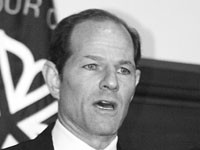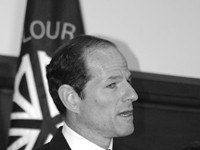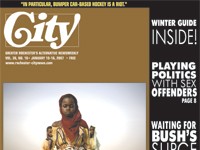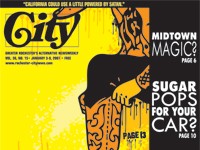[
{
"name": "500x250 Ad",
"insertPoint": "5",
"component": "15667920",
"parentWrapperClass": "",
"requiredCountToDisplay": "1"
}
]
Elections 2006
View our State Legislature Chart here!
Reform in the state legislature: two years ago it was the issue at the tip of everyone's tongue. The BrennanCenter's report was freshly out, chronicling the legislature's dysfunction in excruciating detail. Making the changes the BrennanCenter recommended became a major issue leading up to the elections.
But that was then. This year, well, there are just more distractions. For one thing, there are the far sexier US Congressional races and the suspense of control over of the national agenda.
And while the presumed election of Eliot Spitzer could have boosted discussion of reform, that hasn't happened for the most part. Spitzer has said repeatedly that he plans to bring his talent for fixing up Wall Street to the problem of Albany's culture. But he's been coy about offering specific positions on issues, including reform.
Laboring in the shadows of larger races, and often with miniscule campaign funds, challengers in state legislature races struggle to be heard. Many won't be able to pay for radio or television ads. And few, if any, will get elected.
That, according to the authors of the Brennan report, is exactly what's so problematic about the existing system. The report's authors scrutinized both the State Senate and Assembly and found that practices you might expect in a democracy were either stunted or completely lacking. Bills that made it to the floor of either house always passed, while others disappeared into a mordant committee system.
Legislators in the majority in each house --- Republicans in the Senate and Democrats in the Assembly --- followed the agenda of their leaders, Senate Majority Leader Joe Bruno and Assembly Speaker Sheldon Silver. There was little incentive for rank-and-file legislators to be independent and plenty to keep in line, the report found. The result was that very little policy debate took place before the public on the floor of the legislature.
More than two years later, the BrennanCenter released a follow-up report. Little has changed, it said.
And legislative procedure is only part of the problem. Good-government groups have long called for reforming the way districts are drawn and campaigns are paid for. Right now, both houses redraw district boundaries after each census. That means seats tend to be non-competitive for members of each majority party.
And incumbents' enrollment advantage is extended by their access to more money than most of their challengers can hope to raise. The result is an entrenched establishment of legislators who have little fear of being ousted by unhappy voters.
There are plenty of important issues facing the state --- but they'll get little debate by the people's representatives. True policy compromises are still hammered out in party caucuses, in backroom deals, or between the governor, Assembly speaker, and Senate majority leader --- the "three men in a room."
Considering all that, in interviews with state-legislature candidates this fall City Newspaper focused almost exclusively on reform.
Not surprisingly, every single candidate interviewed said they supported the four reforms we asked about: redistricting, campaign finance, greater independence for committees and committee chairs, and greater control by rank-and-file legislators over what comes to the floor. (A few embraced reform with some hesitation, however.)
In our interviews, some candidates had thoughtful or creative ideas about how to fix redistricting or how campaigns are financed. Also not surprisingly, challengers uniformly condemned the system and insisted that their opponents are part of the problem.
More interesting were the responses of the incumbents. Some defended the status quo or argued that things appear more dysfunctional than they are. Almost all of them said the problems were worse in the other house.
Democratic Assembly member Joe Morelle defended the current system of drawing district lines, for example. First, he argued, gerrymandering isn't as easy as the public seems to think.
"At the state legislative level," he said, "there are three primary considerations on redistricting. The first is there's a stipulation in the state constitution that towns cannot be split into pieces. The second issue that we have to be mindful of is the Voting Rights Act, to make sure that we don't disenfranchise, in particular, people of color. And the third is that the districts have to be all very close to each other in size because of the one-person, one-vote mandate from the Supreme Court."
"So what you have," said Morelle, "is less latitude than people think we have."
Morelle also rejects the idea that removing legislators from the process would result in better districts. A legislator's job is to represent the people, including in the redistricting process, he said.
"Part of the value of having a political discussion about redistricting relates to how a community is represented," he said. "For instance, in this past redistricting process, MonroeCounty effectively lost its power in the House of Representatives. We have not a single member of Congress who has a singular focus on MonroeCounty. That's just an example where a political decision was made, but it could easily have been made by a panel of non-partisan individuals, and the question of whether the political community as representatives of the public ought to have some say in it is still important."
The gist of what Morelle is saying is true: a non-political redistricting panel would still have to choose some priorities over others, and centering a district in this county might not be one of them. But such a process almost certainly wouldn't result in a district as tortured as Louise Slaughter's: a barbell-shaped area 70 or 80 miles long and one town wide for much of its length.
And if Morelle is so enamored of the politicians' role in representing their constituents in all things, including redistricting, is he willing to accept --- along with his GOP Senate colleagues --- some of the blame for divvying up Monroe County into four congressional districts?
Morelle also opposes giving more power to committee chairs --- a key BrennanCenter recommendation. In an interview with City Newspaper this summer (Click here for interview), Jeremy Creelan, one of the report's authors, called committees the laboratories of democracy. Independence for committee leaders would eventually produce better policy, he argued. But Morelle appears to view committees more as a mechanism for maverick legislators to hold the system hostage. Under the Assembly Speaker's control, committee chairs are more likely to cooperate with colleagues, he said.
"With a speaker that's elected by the broad membership of the house, you have someone who has constituents all over the state and has to be interested in those constituencies all over the state, whereas the committee chair doesn't necessarily," said Morelle. "They're not elected by the broad rank-and-file members, and so they could be more autocratic."
For example: "Let's say there's a guy from the Bronx that has a certain philosophy, and all the bills that go through his committee have to share that philosophy," said Morelle. "If you turn control of all the bills that go through that committee over to that individual, you might not end up with better outcomes than you have now."
What he neglects to say is how the speaker comes by his "statewide constituencies": through members like Morelle, who sacrifice some of their own power and therefore their ability to be accountable to their own constituents.
It's an elaborate two-step that keeps the legislators at a safe distance from consequences either at the hands of party leaders or their district's voters.
Speaking of...
-

Reforming from the governor's mansion
Aug 23, 2006 - More »
Latest in Featured story
More by Krestia DeGeorge
-

The last wild Finger Lakes
Jan 17, 2007 -

Designers get their turn at downtown
Jan 17, 2007 -

From the new governor: fighting words
Jan 10, 2007 - More »






